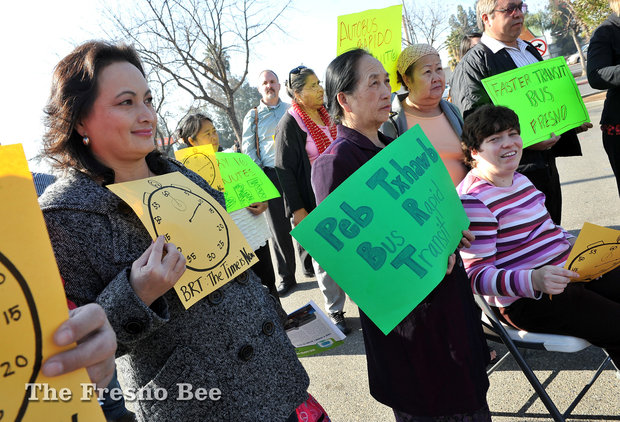
The city of Fresno, California, is a sprawling place, not known for having a strong transit system. But it's been making big strides. Last year, this city of 500,000 passed a "general plan" that called for 45 percent of new development to be "infill," or built in already developed areas.
The plan relies on beefing up transit service as well. The proposal the city settled on calls for two bus rapid transit lines -- one running north-south and the other running east-west. About 60,000 people make their homes within a quarter mile of the proposed routes. Fresno was able to win some $50 million to make it happen, as well, thanks to a federal Small Starts grant and state environmental grants.
The city's major real estate developers, however, never liked the proposal to limit sprawl, and now they're threatening to derail BRT and the general plan. Those plans -- representing almost $60 million in spending -- are on the line in a City Council vote tomorrow. Will local officials vote to proceed with the BRT proposal, as required by state law?
Christine Baker is a coordinator with a group called FLARE Together -- Fresno Leaders Advocating Regionally for Equity. She said city government could go either way. In their opposition campaign, local real estate developers have teamed up with the Tea Party and the Amalgamated Transit Union, whose local leader is allied with Tea Party groups, Baker said. "We have a local PAC that has been running fear mongering ads on local conservative talk radio: 'If BRT is approved crime will increase in Riverpark,'" a shopping center.
If the city refuses to support BRT, it will lose the $50 million in funding -- which included three years of operating money -- as well as some $7 million that was spent developing the general plan. Plus, it will cost millions to develop a new plan.
"There’s no rational argument against it at this point," said Baker. "It's just all out war."
Opponents of the plan have suggested the money would be better spent improving existing bus routes. But federal guidelines wouldn't allow the money to be transferred that way. Furthermore, as the Frenso Bee pointed out in an editorial today, the city was required to show that the bus rapid transit lines would be financially viable in the long term in order to qualify for federal funding. So there's no sound reason to worry that other bus service would suffer.
"The fears raised and the arguments made by BRT opponents don't withstand scrutiny," the Bee editorial board wrote, accusing opponents of employing a "political trick."
"The Fresno City Council must move forward with BRT and give residents a much-needed upgrade in mass transit."





